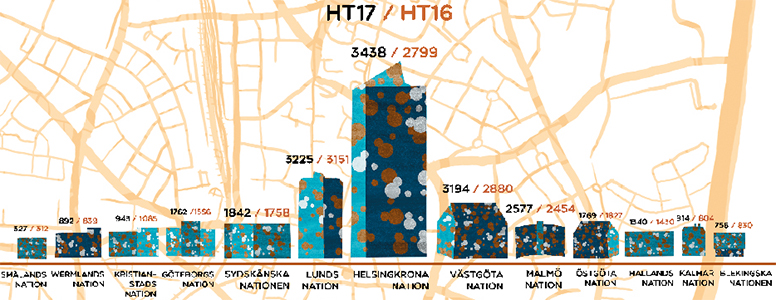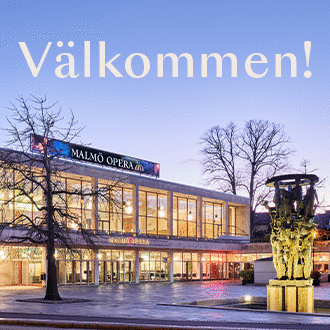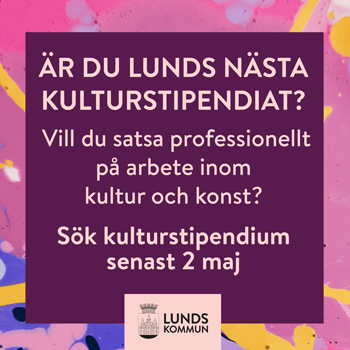The trend has turned. Every nation except Helsingkrona had a decrease in members in the autumn term of 2016. However, during 2017 the membership increased for the majority of nations. Helsingkrona is now Lund’s biggest nation and the fight for the novices was won by Västgöta nation, as it did in 2016.
Written by Simon Appelqvist
Translation by Viktor Jönsson
Illustration by Abigail Allen
The number of members at Studentlund’s nations increased during autumn 2017 by almost six percent. This means that 1239 more students chose to enrol in one of Studentlund’s nations compared to the same period in 2016. The total increase in novices (new nation members) at Lund University was only by 85 which has little impact on the total increase. Helsingkrona nation grabbed the first place as the biggest nation, putting Lunds nation in a second place.
“This, of course, feels good, even if we haven’t had a big focus on it. We have only tried to get as many as possible to become members of our nation”, says Axel Johnson, kurator at Helsingkrona nation.
An effective, yet unexpected, method has been to reduce the opening hours of Helsingkrona nation’s reception.
“Being open two hours per day, instead of eight, has allowed us to focus more on our work during the hours we are closed. And when we finally are open, we can be more welcoming towards those who come. This is something I would recommend other nations to do”, says Axel Johnson.
One attraction the nations have is the Schlagerklubben (schlager club), which has attracted a number of people and is Lund’s biggest club.
“Right now, people like the Melodifestivalen (the Swedish Eurovision Song Contest), but you don’t know how long that will last”, he says.
For two years in a row, Västgöta nation has been the most popular choice amongst the University’s novices, and last autumn 1027 new students chose to enrol in the nation.
“It’s extremely fun that so many are choosing us. We have worked, among other things, to lower the threshold as much as possible to make people active in the nation”, says Joakim Cedergren, kurator at Västgöta nation.
He thinks, foremost, that it is the nation’s wide variety of activities that attracts Lund’s newcomers.
“We have a wide variety which isn’t only aimed towards those who want to go to a pub or club. For example, we arranged for a mobile blood drive, so our members could become blood donors. That was very popular”, says Joakim Cedergren.
“Furthermore, we have also invested a lot in holding different sporting events”, he continues.
Many nations, except Helsingkrona, lost members during the autumn term of 2016. During 2017, there were only three of Studentlund’s nations who shrank: Kristianstads, Hallands and Blekingska.
“For us, it has been going up and down every other term, but it’s hard to say why that is”, says Fanny Stevenhag, kurator at Blekingska nation.
She thinks one reason for the loss of members is the nation’s geographical location.
“Many go to the nearest nation to where you either you live or study. AF Bostäder selling parts of Vildanden, which also is located on the other side of the station, could’ve contributed to the loss”, Fanny Stevenhag.
The students’ living situation is also something Kristianstad nation’s kurator Katrin Sörensen points out as the cause.
“At the enrolment, there were many who asked if we had novice lottery, which we don’t. It was an extreme situation during the fall and many were desperate for a place to live. Then there are of course other, smaller, causes which we must work more on”, says Katrin Sörensen.
For example, the nation will be renovated during spring.
“This hopefully will increase the number of members next autumn term”, says Katrin Sörensen.
David Frödin, chairman of the nation’s’ joint committee Kuratorskollegiet, thinks that the increased cooperation between different actors in Studentlund and the usage of social media in the marketing has contributed to the positive trend.
“Five or six years ago, the nations started appointing people in charge of marketing by using social media, something which I think has made a lot of difference. To market ourselves outwards is one of our core questions”, says David Frödin.
But if the increase in members is evidence of a positive trend is, however, too early to say.
“This is something we will only be able to say in three or four years because there can be many occurrences that we don’t know about right now”, says David Frödin.











